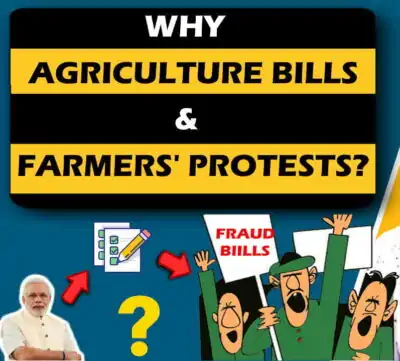Let’s discuss:
• What are APMCs & their functions?
• What are flaws in APMCs?
• What are 3 new Agriculture Bills?
• Pros & Cons of 3 new Agriculture Bills?
Farmers have protested against 3 new Farm Bills 2020 or Agriculture Bills 2020. According to farmers, new amendments through these Bills are against their interests. Farmers think these Bills will ultimately benefit large industrialists and private entities.
Before understanding all the issues, let’s first look at how Indian Agriculture Trading normally takes place in Indian market? Let’s first know the context related to APMCs, and then we’ll look these Bills from different perspectives.
Till now, most of the Indian States implement APMC Act and establish an Agriculture Produce Markets Committee (APMC) at major locations in different parts of the State. Farmers are not allowed to sell their produce outside these APMCs, also called as Mandis.
APMC is basically a platform for the farmers to sell their produce within its limits. APMCs develop market yards so that both farmers (sellers) and buyers (traders/middlemen) can profit from them. In many states, APMCs arrange storage tanks and godowns for farmers.
APMCs govern on two principles:
- Farmers cannot be exploited.
- Farmers can get a fair price for their produce.
Now we know what are APMCs, let’s now look at how APMCs are formed?
Any Particular State is divided into many markets (mandis) where farmers are allowed to sell their produce through auctions. The state government elects or nominate members of APMCs who are then responsible for regulating and controlling APMCs.
Now let’s look at some flaws in Agriculture Produce Market Committees:
1.Traders need a license to operate in Mandis. To get these licenses, bribery is prevalent & they ultimately recover these costs from farmers.
2.No regular elections for members of APMCs in many States.
3.To avoid taxes, traders don’t issue bills. Farmers suffer a lot due to this.
4.Middlemen, without doing many efforts, earns a commission from both farmers & traders.
To tackle these problems, Central government proposed Model APMC Act in 2003.
Now look at some key features of Model APMC Act of 2003:
1.It tried to remove farmer’s obligation to only sell in APMCs.
2.Farmers may sell to anyone outside the APMCs.
3.Monopoly over Agriculture trade by APMCs might have reduced.
– But because of Agriculture being a State subject in 2nd List of 7th Schedule of Indian Constitution, only around 50% States amended their APMC Act. And the States who amended the APMC Act tried to impose excessive obligations on farmers if they want to set up private markets outside the APMCs.
For example, in Andhra Pradesh if anyone wants to set up a private market to trade in agriculture produce have to pay a license fee of Rs 50,000 and the minimum cost of the project should be 10 Crores. These tactics by the State governments prevented farmers from selling outside APMCs.
Reason for all this could be that middlemen and traders might fund the State governments in order to prevent them to make any satisfactory change in APMC Acts for the benefit of the Farmers.
Now when we know so much about APMCs, let’s look at what are the 3 new FARM BILLS? What Central government wants to achieve from these Bills? And Why farmers protested against all these Bills?
- Farmer’s Produce Trade & Commerce (Promotion & Facilitation) Bill, 2020:
- Opens up agricultural sale and marketing outside the notified (APMC) mandis for farmers.
- Removes barriers to inter-State trade.
- Provides a framework for electronic trading of agricultural produce.
- Prohibits State governments from collecting market fee, cess, or levy for trade outside the APMC markets.
- Farmers (Empowerment & Protection) Agreement of Price Assurance & Farm Services Bill, 2020:
- Related to CONTRACT FARMING.
- It provides a framework for the trade agreements between Private Entities & Farmers for a particular quantity & quality of produce.
- For example, a company X now can provide resources and money beforehand to the farmer for producing a particular type, quantity, and quality of Produce (crop).
- Essential Commodities (Amendment) Bill, 2020:
- Removes cereals, pulses, oilseeds, edible oils, onion, and potatoes from the list of essential commodities. The amendment will deregulate the production, storage, movement, and distribution of these food commodities.
- The central government is allowed regulation of supply during war, famine, extraordinary price rises.
- Imposition of any stock limit on agricultural produce must be based on price rise. A stock limit may be imposed only if there is a 100% increase in the retail price of horticultural produce; and a 50% increase in the retail price of non-perishable agricultural food items.
Now let’s look at some Advantages (Pros) of these new Farm Bills 2020:
- Farmers can now sell outside APMCs, and they can’t levy taxes on those. Because of this, middlemen can’t exploit farmers much.
- Removes barriers to inter-State trade which will increase farmers.
- Provides a framework for electronic trading of agricultural produce which can also increase farmers’ income.
- Contract farming can benefit both private entities and farmers. But farmers must be aware of the terms & conditions of the agreement.
Now let’s look at some Disadvantages (Cons) of these new Farm Bills 2020:
- There is no regulation on non-APMC markets. Farmers can be exploited by market forces and private players.
- Deregulating stockpiling can contribute to influencing prices by hoarders (who fluctuate price by controlling demand & supply).
- According to many critics, by reducing APMCs monopoly, govt is trying to run away from MSP (Minimum Support Price) which farmers would get if their produce is not sold in APMCs.
- Many States are alleging that centre is destroying Co-operative federalism by making laws on the State subject of Indian Constitution. According to the Centre, trade & commerce of food items is in the Concurrent List of Indian Constitution, and they are using it to amend laws.
You can access the video version of this Article Here >> BHARAT BANDH – Agriculture Bill 2020 | Farmers Protests | APMCs – Farm Bills EXPLAINED in Hindi
Share this useful information with your legal friends, it will boost our morale to create more content for you!






